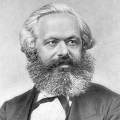Wednesday, August 23, 2006
Let's Make Karl Marx The Next Stephen King!

A man named Francis Wheen has just published a book entitled Marx's Das Kapital: A Biography. That's right - it's a biography of a book, not a man. Das Kapital is one of those tomes like the Bible, the Talmud or the Koran. It is a huge verbal labyrinth inside which a major belief system twists and turns. Its title in English is simply "Capital", and it should strike a chord with millions in America today simply because its author was as obsessed with Capitalism as Bush, as Cheney, as Congress, as Jack Welch or Sumner Redstone or Michael Eisner. Certainly he was at least as obsessed with Capitalism and everything it stood for as you are, whoever you may be. The myth is that Karl Marx wanted to destroy Capitalism, to hasten its downfall and replace it with a new world order. Not so. He wanted only to understand it, at worst to vivisect it.
Dr. Michael Fitzpatrick is a British medical iconoclast who believes doctors should focus on curing diseases once they present themselves instead of terrorizing their patients with unpleasant and statistically ineffective screenings. I like his ideas on modern medicine. What can I say? Any man who tells me I shouldn't need to have a tube stuck up my ass if I don't want to is a man I'll listen to whatever he says. He is also a political writer for Spiked-Online. At the link below he describes his youthful immersion in Das Kapital, and reflects on the book's continuing relevance and its uncannily chameleon-like ability to seem all things to all people. For radical leftists, the book was a recipe for corporate apocalypse, a millenarian screed that invoked the downfall of all profit-mongering. For neo-cons, the book is catnip because it never stops talking about what they most love - money and profit AKA "surplus value".
Few actually read his difficult book all the way through. Hence, he is subject to misinterpretation, his ideas passed along from one person to the next with the distortions of rumor setting in. As Fitzpatrick says, "...contrary to the interpretations of many admirers as well as critics, Marx does not advance a mechanistic thesis of collapse or predict the inevitable downfall of capitalism. He recognizes that crises are both an expression of declining profitability and a mechanism for restoring it." Marx did not see Capitalism ending. He saw it evolving, through fluctuating economic cycles and social conflict. Fitzpatrick emphasizes that "the key factor in the fate of capitalism was the role of class struggle, as the subjective bearer of change..."
Yet the dialectic between workers and management almost no longer exists in Western society. Its demise owes much to what Marx had long ago recognized - that the monetary value of what is produced dwarfs those who produce it, attaining the status of a god while the human beings who nurture it shrink away into nothingness. According to Fitzpatrick, Marx held that the inflated importance of money "conceals the social character of labor and the social relations between producers." Today, the imbalance between Money and Man has gone even further. Now it less conceals than obliterates the social bond between producers, causing management to see us as mere overhead and to discard us at will without any concern for our welfare much less any compulsion to hear us out.
Neo-cons, those Cerberus dogs of upper middle class complacency, believe that we have reached this one-sided dead-end because Capitalism has been stabilized by own perfection, and struggle is no longer necessary. But what if they are wrong? What if improvement is always still possible and can only be achieved through the continued push-and-pull between Us and Them? What if we workers need to be regarded as human again, once more a potent factor in the equation of Capitalism. Get serious, just for the fun of it, for the retro-campy high that it might give you, and check out Das Kapital. Not only was Karl Marx as obsessed with The Big Bucks and their etiology as the wonkiest venture capitalist in Silicon Valley. He was funny, too. Das Kapital is as suffused with irony as, say, Infinite Jest. He was also fascinated with all the funhouse irrationalities of Capitalism, from its macrocosmic reversals of reason right down to absurd little things of the sort that we white collar wage slaves know so well.
"Capital: 'There's nothing remotely like it'" from Spiked-Online

